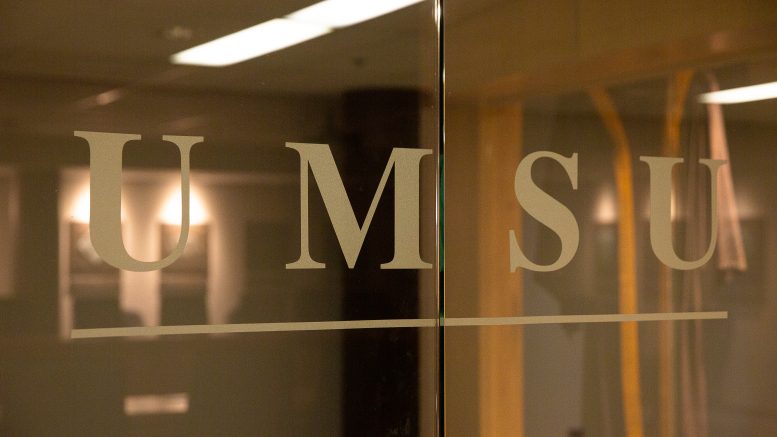After an UMSU Chief Returning Officer’s (CRO) motion to hold a runoff presidential election was ruled out of order at an emergency board of directors meeting last Monday, a new UMSU president was announced.
This meeting was held following the disqualification of one of the four presidential candidates, Justin Langan, who received over 20 per cent of the popular vote. His disqualification was announced to the student body 45 minutes before the polls closed on March 10.
The 912 votes for Langan were counted as abstentions, despite the March 10 email announcing that the votes would be voided. The president-elect, Tracy Ayebare Karuhogo, won by 16 votes.
Langan’s appearance on the ballot was in accordance with UMSU’s rules. Because the candidate appealed his disqualification within 48 hours of the CRO’s decision, the union’s election manual required that his name remain on the ballot while he awaited a decision on the appeal from the UMSU judicial board.
The motion for a runoff election put forward by the CRO was based on two pieces from the election manual. The first concerned instances where “a serious contravention of the election occurs, such that the results of the election could not reasonably be deemed to indicate the actual preference of the voters,” and another concerned procedures in the case of a tie.
Interim board of directors chair Lauren Slegers explained that she determined the motion to be out of order because “those two instances that are mentioned in the election’s manual didn’t actually occur.”
She said that the decision to rule the motion out of order came down to a matter of interpretation of the existing election rules because of a lack of definitions in the manual.
Slegers said that one of the causes of debate during the meeting was the meaning of the term “serious contravention of the election” and whether it would apply to a candidate breaking the rules or the election processes being followed by the CRO.
There is no definition of the term “contravention” in the election manual, so Slegers chose to abide by the dictionary definition. The Merriam-Webster dictionary defines “contravene” as “to go or act contrary to” or to “violate,” and specifies that the word is most commonly used when referring to laws.
Slegers said that because the actual election processes were followed by the CRO, no contravention of the election had occurred, and “there were no rules broken.”
“There was no contravention or violation of the election rules, and so without that contravention being satisfied, basing a motion on that part of the governing document would go against the organization’s governing documents,” she said.
She explained that even though Langan was disqualified for breaking rules, this did not fit into the interpretation of “contravention of the election” that was determined at the meeting.
“Unless it actually interferes with the election, the process and the rules for running the election, then it doesn’t matter how many rules the person breaks,” she said.
The second portion of the motion, which referred to procedures in the case of candidates receiving an “equality of votes,” also came down to the dictionary definition of what “equality” meant due to the lack of a definition of the term in the election manual. “Equality” is defined by the Merriam-Webster dictionary as “the quality or state of being equal,” which in turn is defined as being “of the same measure, quantity, amount or number as another.”
Since no two candidates received the exact same number of votes, Slegers said that using this section of the election manual as the basis for the motion would have also violated the union’s governing documents.
When asked if she thought the ruling undermined democracy in any way, Slegers said that UMSU’s governing documents have been approved by the student body through democratic processes, “and so, despite what anyone might believe is the best process, that hasn’t been put into place.”
According to the union’s bylaws, UMSU’s election manual can be amended with a two-thirds majority vote from the board of directors, which is made up of elected representatives. Resolutions to amend the document must be moved by UMSU’s governance committee, which is made up of appointed members.
“I believe the most democratic way to approach a situation like this is to follow the rules and the governing documents that were democratically created,” Slegers said.
President-elect Karuhogo called the situation “very complex and confusing.”
She added that, as a presidential candidate attending the meeting, she “did not contribute in whichever way.”
“I wanted it to be up to the board to make their decision with all the information they were being provided in order to decide the best path for us moving forward,” she said.
Since the chair ruled the motion out of order based on the union’s governing documents, Karuhogo believes in the ruling. However, she said that “this is something that we have seen that needs to be worked on.”
As president-elect, Karuhogo’s goal now is to work alongside the governance committee to “listen to all the concerns that have been brought forward by students,” and to ensure that “effective changes” are being made.



